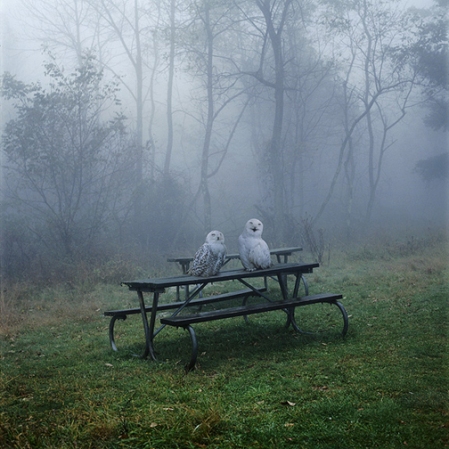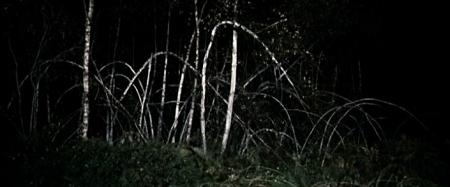In May 2009 Mark Peranson, editor of Cinema Scope, wrote the following hilarious account of the situation at Cannes, in which he called it “the stupidest Cannes ever”:
A deconstruction of what was wrong must begin, I suppose, with Lars von Trier. It would be futile, and, in a way, pointless, in any year to cherry-pick ridiculous observations made during Cannes, but, to begin with a cliché to end all clichés: After the initial screening of Antichrist, a blogger (having read and physically ingested so much about this film I cannot recall who wrote this) stated that he felt he was present for a crucial moment not only of Cannes history, but cinematic history in general. One can only wonder which month of last year this person started to watch film. But, I digress. To discuss Antichrist in such terms—or, indeed, to seek to destroy it—is to play into von Trier’s game. Despite having nine of his ten features screen at Cannes (does anyone have a greater batting average?), he’s always struck me as an overhyped TV director—his best work remains the first Kingdom—so when he abandons storytelling for disjointed proto-Strinbergian-Norwegian death metal psychohorror, well, the wheels have fallen off Lars’ notorious bus. In the context of Cannes, it was hard to completely discount Antichrist: this was, after all, something, or so the argument went. And something is better than nothing.
Antichrist was certainly one of the most calculated ‘art’ films I’ve ever seen, though I have no idea if its auteur had much to do with that. The viewing experience remains inextricable from its neatly packaged behind-the-scenes narrative: Von Trier wrote the screenplay during a “deep depression” from which he hadn’t fully recovered by the time of shooting; he terrorized actress Charlotte Gainsbourgh (after famously having caused Bjork to claim he “destroyed my soul”) into one of the most abject performances of any actress ever; introducing the film at Cannes he announced, apparently in earnest, that he is “the best filmmaker in the world.” All this lives up to his reputation as a neurotic, egomaniacal, misogynist provocateur, while suggesting he might exceed it. Since he is well aware of his media presence and knows how to make films that polarize critical responses into a few predictable genres, he poses something of an existential challenge to critics, who are his target audience. It’s very easy to write about — the streamlined definition of ‘artistic genius.’
Like much recent non-‘art’ horror film, it tries to make outdated cliches effective again. There is no investigation into the issues superficially referenced: the persistent ideological pull of the Judeo-Christian genesis myth, medieval Christianity’s simultaneous demonization of paganism and women, gender roles in the wake of psychoanalysis and behavioral psychology, psychoanalysis as a ‘modern’ justification for the repression of women. Nor is it a treatise of the Godardian type on the cinematic history of these themes.
Instead, Von Trier imagines a world in which every patriarchal ideologeme feminism fought to repress has returned, through the body of Gainsbourgh’s “She.” Willem Dafoe’s hapless psychotherapist husband “He” mistakes the site of this return for her mind, when it’s ‘really’ her Satanic Nature. The ‘turning point’ of the plot — when she cock-punches him with a piece of wood, jerks him off, then drills a stone wheel into his calf — comes just after he concludes that his wife’s psychosis is due to self-loathing. But her slide into insanity, apparently predating their toddler’s death, is unstoppable. Even before arriving at their surrogate Eden (the name of their cottage in the woods) – at once a retreat from their lives and a confrontation with their suffering – it becomes ‘natural.’
There are two ways in which this deeply annoying film is nevertheless worth paying attention to. In both visual style and in the attempt to recreate for the screen what the movements of the ’60s and ’70s confronted and tried to overcome, it is a kind of summation of the U.S. Aughts’ various horror trends, especially J-horror and ‘torture porn’ (there’s a piece by Christopher Sharrett in the Winter 2009 issue of Cineaste that exposes the pretensions of the latter to recreate ’70s horror). This allows it to be be read as a coda in advance to Von Trier’s unfinished U.S. trilogy (Dogville and Manderlay) — America as an exotic locale, a computer-generated fantasy land. As infinite thought notes here, the forest around Eden looks as if it were always digitally rendered. The landscape shots are also reminiscent of recent photography, such as that of Martina Lindqvist and Simen Johan, where forests, animals, and coastlines are given a properly uncanny quality, their typical (and typically American) significance as reminders of timeless innocence détourned.
Martina Lindqvist, from Rågskär Island, 2008
 Simen Johan, from Until the Kingdom Comes, 2006
Simen Johan, from Until the Kingdom Comes, 2006
The film’s inchoate aura of doom links it not only to the work of Kiyoshi Kurosawa (Kairo), Hideo Nakata (Ringu), and David Lynch (everything from Lost Highway on), but also American formalist doomsday films No Country For Old Men, There Will Be Blood, and The Road. But the distinctive thing about Antichrist is that America’s vision of nature, not just its capitalist culture, has become decadent; what at first resembles a Native American vision quest (the three creepy animals who might be spirit guides, Eden’s initial appearance in a hypnosis-induced dream) is revealed to be a regression in the wrong direction, away from settler Enlightenment and toward a distinctly medieval, European vision of apocalypse.
The second way is as a visual example of structuralism. She” is not a proper name, a person with a psychology to be penetrated and rehabilitated, but the name of a set: all women, just as “He” is all men. Adam and Eve are figures of nostalgia when ‘Eden’ is a well-heeled couple’s private vacation spot. “He” and “She” are the archetypes of gender itself, artifacts of psychology’s quixotic (or cynical) and all too liberal attempt to describe in the jargon of personality what it has already determined to be better represented by the jargon of objects. Lacan derisively calls this contradiction ‘ego psychology,’ and the film is equally contemptuous of “His” CBT-inspired theorizing. But Nature rhetoric aside, the hysterical violence of Antichrist’s final act forecloses conservative nostalgia for ‘pre-modern’ gender relations. Something rather different is at work here. I’m reminded of the term catmint coined to diagnose Zizek’s op-eds, ‘structuralist pornography:’
The affectivity of structuralism is built around the logic of (pre whig era) conservatism. Structuralism isn’t selling conservatism but it does dramatically ask: what if conservatism is after all reasonable? It restates the idea of a mysterious quasi-divine social order, not as the basis of political commitment but as a horrifying possibility undermining political commitment. It’s surely of a piece with the vague politics of the middle class; predicated on a worried sort of liberalism. But again it’s not too far from conservatism proper, which was always an orthodoxy of absent arguments; the arguments of conservatives being nearly always bad (there’s also a relation to masochism).
One can hear this almost literally announced in the dialogue, which is that of archetypes talking to each other. As is typical of Von Trier, it would feel more ‘at home’ on the stage (and despite the woodland setting sounds as if recorded in a studio optimized for radio or musical performance), and this is what one notices before anything else. Take this typical exchange:
She: If human nature is evil, then that goes as well for the nature of…
He: Of the women. Female nature.
She: The nature of all the sisters. Women don’t control their own bodies. Nature does. I have it in writing in my books.
He: The literature that you used in your research was about evil things committed against women, but you read it as proof of the evil of women? You were supposed to be critical of those texts. That was your thesis! Instead, you’re embracing it! Do you know what you’re saying?
She: Forget it. I don’t know why I said it.
This dialogue is technically bad because it is too meaningful; both too clear about what it means and too abstract to be clear beyond the ‘domain of the signifier.’ Its transcendental dullness kills the possibility of subtext, reading it is a matter of plug & play. It’s up to the violence and delirious imagery to give affective force to what would otherwise be an unbroken string of banalities. However, Von Trier is unwilling to let horror fans ‘indulge’ in making sense out of the bloodshed, whether merely as visceral thrills, or aesthetic appreciation (like in Dario Argento), or as socially significant (like in George Romero’s zombie movies). Instead the intended audience of cinephiles, professional critics, and academics is made to feel the power of apocalyptic patriarchal mysticism, even to suffer from it (to feel physically sick, emotionally terrorized), all while being unable to interpret it in a way that isn’t repellent. In this way Antichrist is as emptily sermonizing as the rest of the director’s recent oeuvre.
“All determinations become bad and cruel when they are grasped only by a thought which invents and contemplates them, flayed and separated from their living form, adrift upon this barren ground. Everything becomes violence on this passive ground. Everything becomes attack on this digestive ground. Here the Sabbath of stupidity and malevolence takes place. Perhaps this is the origin of that melancholy which weighs upon the most beautiful human faces: the presentiment of a hideousness peculiar to the human face, of a rising tide of stupidity, an evil deformity or a thought governed by madness. For from the point of view of a philosophy of nature, madness arises at the point at which the individual contemplates itself in this free ground — and, as a result, stupidity in stupidity and cruelty in cruelty — to the point that it can no longer stand itself…Stupidity is neither the ground nor the individual, but rather this relation in which individuation brings the ground to the surface without being able to give it form (this ground rises by means of the I, penetrating deeply into the possibility of thought and constituting the unrecognized in every recognition).“
— Gilles Deleuze, Difference & Repetition
The presence or absence of the self at the root of every bad thing, the ambivalence of bourgeois morals, rests on a certain spiritualized intransigence, something ostensibly disowned but in fact kept as close as a security blanket. Von Trier, quite knowingly, can only replay what he pretends to punish, in himself as well as his audience: yet one more complex, paradoxical, brilliant route to abject stupidity.


